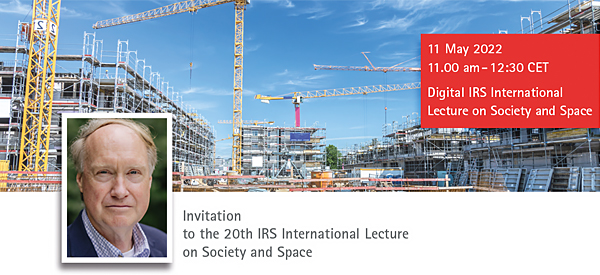Hauptinhalt
Explanation in Urban Studies: “Comparative Tactics” and Business Models of Developers as Inputs to a Globally Inclusive Urban Theory
20th IRS International Lecture on Society and Space with Örjan Sjöberg, Stockholm School of Economics

Urban theory has long been struggling to find its feet. It has been criticised for an inclination to favour paradigmatic cities, for not being particularly inclusive or for ignoring the importance of context. The alternatives have been reproached for being particularistic, arbitrary and ignoring economic imperatives, voluntarism taking the upper hand over structural features. Or that that urban and the process of urbanisation are essentially the same everywhere. In short, we can all find our favoured critical stance. However, that does not solve the problem of balancing the need to understand the typical or singular with the importance of identifying the general or universal. Under these circumstances, how to get access to both insight and explanation? This talk, built on the twin contentions that comparability is useful and that we would do well to start in middle-range theory, focuses on an empirical phenomenon that can be found in most urban settings yet is unlikely to look the same everywhere: the nature of urban land value capture. Although neither urban political economy nor real estate economics have been oblivious to its importance, the manner in which value capture has been approached has tended to focus either on how developers can use it to attract investors or how to make, for instance, transit-oriented development financially viable. Either way, it tends to leave out the value proposition to the ultimate users – how it is created and how gains are shared – and the positive and negative externalities that are generated along the way. Putting business models centre stage, a simple analytical framework is suggested.
Discussant: PD Dr Matthias Bernt, IRS
Vita
Örjan Sjöberg is Professor of Economic Geography at the Stockholm School of Economics (SSE), a position he has held since 2001. He is also one of three Research Directors at the Centre for Sustainability Research at SSE. Örjan received his PhD in Human Geography at Uppsala University in 1991 after which he received an assistant professorship at SSE’s then Dept. of International Economics and Geography. Over the thirty years since he has taught courses at all academic levels, including on economic geography, international economics, globalisation, institutions and economic development, Asian and transition economies, urban studies as well as business and climate change. In addition to being the author of a monograph on rural change and development under central planning – the PhD, pursued in parallel, focused on migration, urbanisation and labour markets, also that in the setting of a centrally planned one-party state – he has published several edited volumes on various subjects. His articles have appeared in journals such as Annals of the Association of American Geographers, Economic Geography, Environment and Planning A, Geoforum, International Journal of Urban and Regional Research, Tijdschrift voor Economische en Sociale Geografie, Urban Studies and in several area studies journals. Current research focuses on urban sustainability and on issues related to the integration of migrants.

